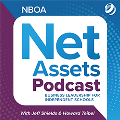
NBOA President and CEO
I’ve been thinking a lot lately about the leadership that has been required for our schools and, even professional associations like NBOA, to navigate the pandemic. I’ve said it numerous times and I’ll say it again: the agility and creativity that we tapped and strengthened over the past year and a half will be indispensable as we navigate challenges — known and unknown — ahead.
A recent Harvard Business Review article, “Every Leader Has Flaws. Don’t Let Yours Derail Your Strategy.” by Ron Carucci and David Lancefield, speaks directly to the issue of forward-thinking leadership. It reminded me of some of the best advice I got from one of my early professional mentors regarding “overused strengths.” This is an aspect of leadership that doesn’t get much attention. We all know leaders that we respect and admire for a particular trait. This could be decisiveness, articulate speaking, or idea generation, for example. A leader’s greatest asset, however, can become a detriment. The authors explore four types of strengths that can knock sound strategy off course.
All the same, highly confident leaders can benefit from assembling a network of individuals who have the courage to challenge you and offer differing opinions that you respect. You could also consider working with outside advisors who provide a fresh perspective and help you test ideas before you charge full steam ahead.
The overconfident leader may feel invincible. Perhaps you are a new leader at your school and have picked off a few quick wins, like advancing automation in the business office. Or you’re an experienced leader and have accomplished what many thought was impossible this past year by setting up a weekly COVID-19 testing program. All the same, highly confident leaders can benefit from assembling a network of individuals who have the courage to challenge you and offer differing opinions that you respect. You could also consider working with outside advisors who provide a fresh perspective and help you test ideas before you charge full steam ahead.
The impulsive leader loves the latest and greatest idea, whether it is going whole hog on new software or hiring a consultant that promises to have the silver bullet for your school’s financial woes. This leader may leap before they look. If you lead this way, and in the past earned more hits than misses, trusting your gut works for you. But to ensure organizational success, the authors encourage this type of leader to take time to: review the data, consider the risk factors in acting too hastily or not acting at all, and finally, understand the adrenaline rush that comes when going for the brass ring. I rely on my instincts too, and am easily attracted to what is new or different, so I am going to take some of this advice myself.
The rigidly controlling leader works in a very predictable and prescribed way. If we know anything from the past year, it’s that we are not in control and we never really have been. This kind of leader needs to grow more comfortable with new ways of approaching challenges and may need to listen more readily to new ideas. This leader can benefit from connecting with trusted colleagues to find out what new approaches have been successful, perhaps through NBOA Connect, and consider these ideas for their own school. Knowing that “what got us here may not get us there,” these leaders should try demonstrating greater curiosity about what other opportunities may be a good fit for them and their school.
Don’t let failure paralyze you with self-doubt. This past year we made the best decisions we could make with the information we had at the time, and some decisions worked out better than others.
Finally, the insecure leader, like all of us, faces a crisis of confidence. If you’re someone that has not had a “fabulous failure” in your career, then you are one of the lucky ones. I know I have had my share. Don’t let failure paralyze you with self-doubt. This past year we made the best decisions we could make with the information we had at the time, and some decisions worked out better than others. You get a pass. Broaden your focus beyond the worst-case scenarios and consider the best-case scenarios. I also recommend reviewing past successes and remembering the components that helped them succeed.
We have a lot to be proud of with regard to the way we have led our schools in the past year. In many cases, our schools have not just survived but thrived. It is important, however, to remember that no one is perfect. As we navigate the future, we can’t let what should be our leadership strengths fail us or our schools, and we can take demonstrative actions to ensure we actively build on them. Lead on!

Follow President and CEO Jeff Shields @shieldsNBOA.


